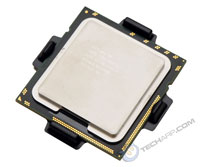Conclusion
The Intel Core i7-975 Extreme Edition is more than just a slightly faster version of the Core i7-965 Extreme Edition processor. It uses the new D0 core, which is an improved version of the original C0 core that debuted in the Core i7-965 EE.
What's new in the new core stepping? Well, Intel ain't telling, that's for sure. As far as their customers (that's us!) are concerned, nothing significant has changed between the two steppings, but we know better, don't we?
Our benchmarks have shown that despite a mere 4% boost in clock speed from its predecessor, the Core i7-965 Extreme Edition, the Core i7-975 Extreme Edition is generally 5-6% faster than the Core i7-965. That points to internal performance improvements in the new D0 core itself.
If we were to compare the two cores at the same clock speed, the D0 core would be about 1.5% faster than the D0 core. A small improvement to be sure, but a noticeable one nonetheless. Coupled with the higher clock speed, you end up with a processor that's significantly faster than its predecessor.
The Core i7-975 Extreme Edition also comes with a whole slew of features to differentiate it from its "lesser" non-Extreme Edition brethren. First and foremost, it has unlocked multipliers. This gives overclockers much greater flexibility. It also allows you to circumvent the 2-bin limit when the Intel Turbo Mode Technology kicks in.
The Core i7-975 also has a much higher QPI speed of 6.4 GT/s, which is 33 % faster than that of the Core i7-950, the Core i7-940 and the Core i7-920 processors. The faster QPI speed allows for faster communications between the CPU and the X58 Express chipset. Finally, it comes with the Delta DBX-A cooler, which is a better cooling solution than the DBA-A that ships with the non-Extreme Editon processors.
Even with all these advantages, is the Intel Core i7-975 worth splurging on? It is, no doubt, the most expensive desktop processor in Intel's Core i7 family and will remain so for a very long time to come. Only the non-Extreme Edition Core i7-940 and Core i7-920 have become relatively affordable, if not quite as affordable as the new Intel Core i5 processors.
For certain, they are a long way from becoming as mainstream as Intel's Core 2 Quad and Core 2 Duo processors. The Intel Core i7-900 series of processors, whether Extreme Edition or otherwise, have been positioned as premium desktop processors above the Core i5 processors, and one that uses a different platform to boot. As such, the decision to migrate to the LGA 1366 platform is not one to be taken lightly.
If you do a lot of work with multi-threaded applications that require a lot of processing power and memory bandwidth, then it may be worth considering the Intel Core i7-975 Extreme Edition processor. As our tests results have shown, the Core i7-975 EE did very well in multi-threaded applications like CINEBENCH R10 and the x264 video encoder, providing significant performance boosts over the non-Extreme Edition Core i7 models.
It also did pretty well in single-threaded applications. However, it would be hard to justify the cost if you are only running simple office applications. Not many games benefit much from the Core i7 processor. Graphics-intensive games like Crysis benefited the least, contrary to what Intel has been peddling to the media. Games that benefit the most from the Core i7 processor would be those that feature a significant amount of game physics, like Left 4 Dead.
If you want value for money, there is always the Intel Core i5 processors. Unlike the Core i7 processors, the Core i5 processor uses a different, incompatible LGA 1156 socket and lack the QuickPath Interface. They also support only two DDR3 memory channels. However, both CPU and motherboard of this platform are more affordable than the Core i7's LGA 1366 platform.
But if you absolutely must have the fastest quad-core system possible, then the Intel Core i7 processor is the way to go. These are really fast processors, especially for media encoding and professional 3D rendering. The choice of whether to go with the Core i7-975 Extreme Edition or a lower-end Core i7 processor is something you will have to decide, based on your needs and budget. This is certainly a very, very expensive processor, but it does offer more advantages over its non-Extreme Edition brethren than was the case with the Core 2 family of processors.
| Pros : | • Fastest quad-core desktop processor on the planet at time of publication! |
| Cons : | • Very expensive processor. Purchase automatically confirms your ULTRA-LICH status! |
Support Tech ARP!
If you like our work, you can help support out work by visiting our sponsors, participate in the Tech ARP Forums, or even donate to our fund. Any help you can render is greatly appreciated!
Page |
Topic |
|
1 |
||
2 |
||
3 |
• The Intel Core i7-975 Extreme Edition Processor |
|
4 |
||
5 |
||
6 |
||
7 |
||
8 |
||
9 |
||
10 |
||
11 |
||
12 |
Questions & Comments
Please feel free to post your questions or comments here!
| Date | Revision | Revision History |
| 15-12-2009 | 1.0 | Initial release. |







 Add to Reddit
Add to Reddit

